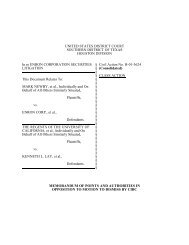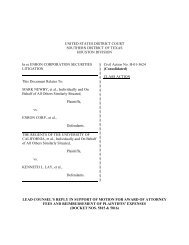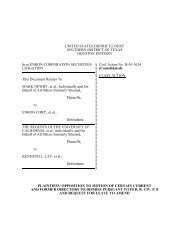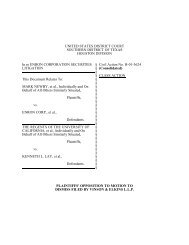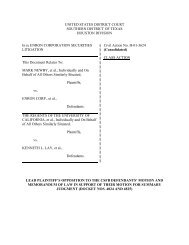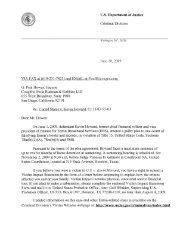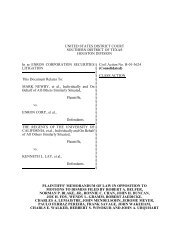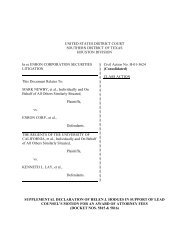Declaration Of Helen J. Hodges In Support Of Lead Counsel's ...
Declaration Of Helen J. Hodges In Support Of Lead Counsel's ...
Declaration Of Helen J. Hodges In Support Of Lead Counsel's ...
You also want an ePaper? Increase the reach of your titles
YUMPU automatically turns print PDFs into web optimized ePapers that Google loves.
institutional plaintiffs, their representatives, as well as individual investors’ depositions, and any<br />
experts plaintiffs intended to rely on for class certification purposes. Notably, the “class<br />
certification” depositions were noticed for the week of August 12, 2002 through August 16, 2002,<br />
resulting in as many as eight plaintiffs being deposed, simultaneously, in a single eight-hour period<br />
at various Houston law firms. When totaled, defendants had noticed a minimum of 29 “class<br />
certification” depositions over five business days in Houston at various law firms representing<br />
defendants.<br />
73. <strong>Lead</strong> Counsel immediately moved for a protective order to curtail the abuse. The<br />
motion for protective order was filed on August 13, 2002 (Docket No. 1000). <strong>In</strong> the protective order<br />
motion <strong>Lead</strong> Plaintiff said it responded to the noticed depositions by offering a Rule 30(b)(6)<br />
deponent from The Regents who would be most knowledgeable about the decision to invest in Enron<br />
securities. <strong>Lead</strong> Plaintiff had conferred with other plaintiffs, and further agreed to produce persons<br />
most knowledgeable on behalf of each institutional plaintiff, and even agreed to produce individual<br />
named plaintiffs, committing to at least 16 depositions. Defendants, however, rejected the proffer.<br />
74. <strong>In</strong> its motion for protective order <strong>Lead</strong> Plaintiff argued its proffer of the person most<br />
knowledgeable was preferred to the “shotgun” method of noticing myriad individuals for deposition,<br />
resulting in satellite litigation that would be duplicative, wasteful and costly. <strong>Lead</strong> Counsel argued<br />
the Federal Rules command that litigants depose persons most knowledgeable instead of the<br />
duplicative, costly depositions propounded by the defendants, and that the depositions’ true purpose<br />
was harassment.<br />
75. The protective order also sought an order preventing defendants from propounding<br />
onerous document production requests that sought personal and financial information unrelated to<br />
Enron. For example, defendants had propounded document requests asking individual plaintiffs to<br />
produce “all documents” concerning their financial net worth, assets, debts, financial status – even<br />
- 35 -



